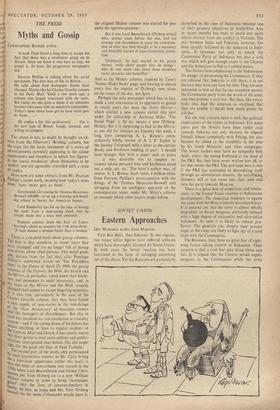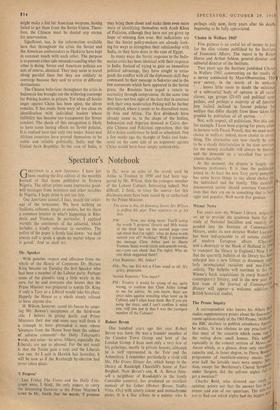SOVIET UNION
Eastern Approaches
DEV MURARKA writes from Moscow:
First Ben Bella, then Sukarno. In two regions, two major leftist figures have suffered setbacks which have thoroughly alarmed the Soviet Union. In both cases the Soviet reaction has been restrained in the hope of salvaging something out of the chaos. Yet the Russians are particularly
disturbed in the case of Indonesia because one of their primary objectives in South-East Asia in recent months has been to avoid any upset which detracts from the conflict in Vietnam. The war between India and Pakistan, however, has been quickly followed by the upheaval in Indo- nesia. It threatens not only to smash the Communist Party of Indonesia but also a civil war which will give enough scope to the Chinese and the Americans to fish in troubled waters.
The Soviets have emphasised to the Indonesians the danger of persecuting the Communists. If they are relieved that Sukarno is still there, it is not because they have any love for him. They are now interested in him so that he can somehow protect the Communist party from the wrath of the army and thus prevent a civil war. But they, like every- body else, find the situation so confused that they are unable to decide how much power he still has.
Yet the real concern here is with the political implications of the events in Indonesia. For some years past the Soviets have been rather cool towards Sukarno not only because he aligned himself almost completely with Peking, but also because he added to the instability in the area by his 'crush Malaysia' and other campaigns. The Soviet leaders may have no sympathy with Aidit, either, the young firebrand at the head of the PKI. But they have never written him off, or for that matter the PKI. The new hope here is that if the PKI has succeeded in discrediting itself, through an adventurous disaster, the anti-Peking elements will at last come into their own and turn the party towards Moscow.
There is a great deal of scepticism, and amuse- ment, at the United States reaction to Indonesian developments. The American tendency to equate the army with the West is heavily discounted here. It is pointed out that the army is almost wholly dependent on Soviet weapons, politically imbued with a high degree of nationalist and ultra-leftist sentiment. As such it is likely to remain pro- Soviet. The generals too, despite their present anger at the coup, are likely to fight shy of a total clash with the Communists.
The Russians, then, have no great fear of right- wing forces taking control in Indonesia. Their concern is that a civil war may bring about just this. It is argued that the Chinese would supply weapons to the Communists while the army
might make a bid for American weapons, having failed to get them from the Soviet Union. There- fore, the Chinese must be denied any excuse for intervention.
Significant, too, is the information available here that throughout the crisis the Soviet and the American ambassadors to Djakarta have kept in constant touch with each other. The purpose is to prevent either side misunderstanding what the other is doing. Soviet and American policies are not, of course, identical. They may seem to travel along parallel lines but they are unlikely to converge because they seek to arrive at different destinations.
The Chinese behaviour throughout the crisis in Indonesia has brought out the withering contempt for Peking leaders in private. Yet when all Soviet anger against China has been spent, the alarm • remains. It has made them wary of too close an identification with individual leaders whose fallibility has become too transparent for Soviet comfort. The shock of this recognition is likely to have some lasting effects on Soviet policies. It is realised here that only two major Asian and African countries have proved themselves to be stable and reliable politically, India and the United Arab Republic. In the case of India, it may bring them closer and make them even more wary of identifying themselves with Ayub Khan of Pakistan, although they have not yet given up hope of winning him over. But indications are that the Soviet policy-makers are already look- ing for ways to strengthen their relationship with India, as they have done in the case of Egypt.
In many ways the Soviet response to the Indo- nesian crisis has been identical with their response in India. Instead of trying to gain an immediate political advantage, they have sought to extin- guish the conflict with all the diplomatic, skill they command. In their message to Sukarno and in the few comments which have appeared in the Soviet press, the Russians have urged a return to normality through compromise. At the same time they have not lost sight of the fact that in contrast with their own moderation Peking will be further discredited, where it needs to be discredited most, in Asia and Africa. The first dividends have already come in, in the shape of the Indian, Indonesian and Algerian demand at Cairo, des- pite Chinese and Pakistani opposition, that the Afro-Asian conference be held as scheduled. Just a few weeks ago the thought of India and Indo- nesia on the same side of an argument against China would have been simply unthinkable.







































 Previous page
Previous page